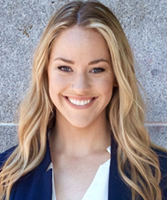
Sarah Cole
Charles E. Schmidt College of Medicine at Florida Atlantic University - Class of 2024
Sarah Cole is a competitive, occasionally headstrong-- but always learning-- wife, sister, daughter, teammate, and second-year medical student at the Charles E. Schmidt College of Medicine at Florida Atlantic University. She strives to bring joy to others, improve lives, and advocate for the vulnerable.
Who are you? Have you ever sat down and thought about your identity?
If you are in medical school, the answer is likely yes—thanks to the copious number of questions on the primary and secondary applications. But if you are like most, you probably answered these personal probes with an eloquent version of a list: a historical account of your accomplishments or times you displayed buzzword qualities [like] “empathy” or “compassion,” to name a few. But are you only a sum total of your life experiences? I would argue not.
After a life chock-full of academic and athletic accolades, I found myself in my first year of college having just quit a Division I volleyball team and disengaged from my classes. Without academics and athletics—the two pillars of my identity-- I felt incredibly lost and spent the next year recovering from an eating disorder. It is difficult to string together words to accurately capture the gratitude I have for that period of critical self-exploration and for my parents enabling me to take pause.
Prior to that year, if you asked me to write a 1-2 sentence biography, it may have gone something like this: “Sarah Cole recently graduated summa cum laude, earning the Outstanding Student in Math while serving as captain of the varsity volleyball team. She plans to go on to play Division I while earning her degree in mechanical engineering.” When I read it now I cringe. What would happen to that Sarah if she were to lose sports? Or decide engineering was not the right fit? Would she still be Sarah?
What would happen to you if you failed an exam? If you missed a patient’s diagnosis?
I was lucky enough to get help when I needed it, to struggle with these questions in the hands of a professional and with the support of my family. But one of the lessons I learned is easily accessible: we are not solely defined by how we have spent our time. While experiences undoubtedly contribute to the fabric of our identity, it is a disservice to ignore the quirks and oddities that make us, us. During my year of transformation, I started asking myself simple questions with simple answers:
What brings you joy? Making food for other people. A color-coded closet.
What frustrates you? Inefficiencies. Inequities.
What motivates you? Being underestimated. Wanting to win.
As the list went on, I realized how much I had to learn about myself. It was the first time I tried to define my identity beyond the accomplishments or experiences on my resume. And it was liberating. I learned that I was an ever-evolving person in motion, someone who loved creating memories with family, who starts every project with a spreadsheet, and who feels anxious when those around me don’t know me. None of these things could ever be taken away—no imperfect score, rejected interview, or athletic injury could erase these pieces of who I am. I was the sole owner, sole proprietor.
I bet a lot of medical students share similar biographies—we are a high-achieving bunch. And we shouldn’t give that up; but if we defined ourselves in the context of who we are rather than what we’ve done, perhaps the pressure to accrue awards, positions, grades and accolades wouldn’t feel so overwhelming. Perhaps if we reclaimed our identities we might be a little more resilient to the inevitable highs and lows on the journey to becoming a physician. I don’t mean to minimize the inherent flaws in our system that deserve attention, but self-identity is one component of improving wellness. Every medical student, every person, deserves to know and appreciate who they are. Life is so much better on the other side.